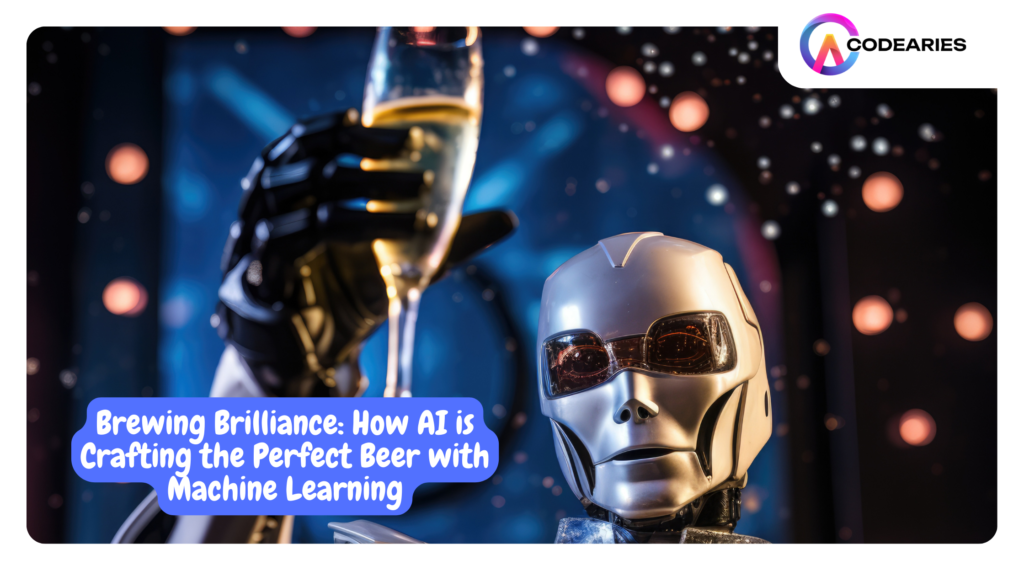Brewing Brilliance How AI is Crafting the Perfect Beer with Machine Learning

Introduction
The craft beer industry has seen tremendous growth over the past decade, driven by consumers’ increasing demand for unique and high-quality brews. As the industry expands, so does the need for innovation in brewing processes and recipe development. Artificial Intelligence (AI) and machine learning (ML) are emerging as powerful tools in this domain, offering brewers new ways to optimize production, reduce waste, and create novel beer recipes tailored to consumer preferences. This article delves into how AI is revolutionizing the craft beer industry, presenting data and case studies to illustrate its potential.
The Rise of Craft Beer
Craft beer has evolved from a niche market to a significant segment of the global beverage industry. According to the Brewers Association, the craft beer market in the United States alone was valued at over $29 billion in 2020, accounting for nearly 24% of the overall beer market. This growth is attributed to several factors:
- Consumer Preferences: A growing number of consumers prefer the diverse flavors and unique brewing methods of craft beer over mass-produced alternatives.
- Innovation: Craft breweries are known for their innovative approaches, experimenting with different ingredients and brewing techniques.
- Local Support: Many consumers choose to support local breweries, valuing the craftsmanship and community engagement they represent.
The Challenges in Craft Beer Brewing
Despite its growth, the craft beer industry faces several challenges:
- Consistency: Maintaining consistency across batches can be difficult due to variations in ingredients and brewing conditions.
- Efficiency: Optimizing brewing processes to reduce waste and improve efficiency is crucial for profitability.
- Recipe Development: Creating new and unique beer recipes that appeal to consumers is a constant challenge.
- Quality Control: Ensuring high-quality standards throughout the brewing process is essential for brand reputation.
The Role of AI in Craft Beer Brewing
AI and machine learning offer solutions to these challenges, providing brewers with tools to enhance every aspect of the brewing process, from ingredient selection to fermentation control and flavor profiling. Here’s how AI is being applied in the craft beer industry:
1. Optimizing Brewing Processes
AI can optimize various brewing processes, improving efficiency and consistency. Machine learning algorithms can analyze data from previous batches to identify patterns and predict outcomes, allowing brewers to fine-tune their processes.
Techniques and Applications:
- Predictive Analytics: Machine learning models can predict the outcome of brewing processes based on historical data, helping brewers adjust parameters to achieve desired results.
- Process Automation: AI can automate routine tasks, such as temperature and pH monitoring, ensuring optimal conditions are maintained throughout the brewing process.
- Waste Reduction: By analyzing data on ingredient usage and waste, AI can suggest ways to minimize waste and improve efficiency.
Case Study:
Deschutes Brewery, a leading craft brewery in the United States, has implemented AI to optimize its brewing processes. Using machine learning algorithms, Deschutes can predict the impact of various brewing parameters on the final product, allowing them to make data-driven adjustments. This has led to significant improvements in efficiency and consistency, reducing waste and enhancing product quality.
2. Enhancing Quality Control
Quality control is critical in craft beer brewing, where even minor variations can affect the final product. AI can enhance quality control by providing real-time monitoring and analysis of brewing conditions, ensuring high standards are consistently met.
Techniques and Applications:
- Sensor Integration: AI systems can integrate data from sensors placed throughout the brewing process, monitoring parameters such as temperature, pressure, and pH levels.
- Anomaly Detection: Machine learning algorithms can detect anomalies in real-time, alerting brewers to potential issues before they impact the final product.
- Predictive Maintenance: AI can predict when equipment is likely to fail, allowing for proactive maintenance and reducing downtime.
Case Study:
Carlsberg Group, one of the world’s leading brewery groups, has developed an AI-driven quality control system known as the “Beer Fingerprinting Project.” This system uses sensors and machine learning algorithms to monitor and analyze various brewing parameters, ensuring consistency and quality in every batch. The project has led to a significant reduction in quality control issues and has been instrumental in maintaining Carlsberg’s reputation for high-quality beer.
3. Creating New and Unique Beer Recipes
One of the most exciting applications of AI in craft beer brewing is in the creation of new and unique beer recipes. By analyzing consumer preferences and historical data, AI can suggest novel combinations of ingredients and brewing techniques, helping brewers stay ahead of market trends.
Techniques and Applications:
- Flavor Profiling: AI can analyze data on consumer preferences, identifying popular flavor profiles and suggesting new recipes that match these tastes.
- Ingredient Optimization: Machine learning algorithms can analyze the impact of different ingredients on the final product, helping brewers create balanced and flavorful beers.
- Consumer Feedback Analysis: AI can analyze consumer feedback from social media, reviews, and surveys, providing insights into what consumers want in a new beer.
Case Study:
IntelligentX Brewing Co., a London-based brewery, has developed AI-driven software that uses machine learning to create new beer recipes based on consumer feedback. The software analyzes data from customer reviews and preferences, suggesting adjustments to existing recipes or entirely new combinations of ingredients. This approach has resulted in a range of innovative beers that have been well-received by consumers.
Benefits of AI in Craft Beer Brewing
The integration of AI into the craft beer industry offers numerous benefits, enhancing the efficiency, creativity, and profitability of breweries. Here are some of the key advantages:
- Improved Consistency: AI can ensure consistent quality across batches by optimizing brewing processes and monitoring conditions in real-time.
- Increased Efficiency: AI-driven automation and predictive analytics can streamline operations, reducing waste and improving efficiency.
- Enhanced Creativity: By analyzing consumer preferences and historical data, AI can help brewers create innovative and unique beer recipes.
- Better Quality Control: AI can provide real-time monitoring and anomaly detection, ensuring high-quality standards are consistently met.
- Cost Savings: Optimized processes and reduced waste translate to significant cost savings, improving the profitability of breweries.
Future Prospects and Challenges
The future of AI in craft beer brewing holds immense potential, but it also presents several challenges. Addressing these challenges is crucial for the successful integration of AI into the industry.
Future Prospects
- Advanced Flavor Analysis: AI has the potential to analyze complex flavor compounds and predict how different ingredients will interact, leading to the creation of truly unique beers.
- Personalized Brewing: AI could enable personalized brewing experiences, where consumers can customize their own beer recipes based on their preferences.
- Integration with IoT: Combining AI with the Internet of Things (IoT) could provide even more granular control over brewing processes, enhancing efficiency and quality.
- Sustainability: AI can help breweries adopt more sustainable practices by optimizing resource usage and reducing waste.
Challenges
- Data Quality and Availability: High-quality data is essential for training AI models. Ensuring the availability and accuracy of data can be challenging.
- Human Acceptance: Gaining the trust and acceptance of brewers and consumers is essential for the widespread adoption of AI in the industry.
- Technical Limitations: AI systems are not infallible and can sometimes produce inaccurate results. Ensuring the reliability of AI models is crucial.
- Ethical Considerations: Ethical issues related to the use of AI in food and beverage production, such as transparency and consumer consent, must be addressed.
CodeAries: Enhancing Craft Beer Brewing with AI Innovations
CodeAries, a leading provider of IT software development services, is uniquely positioned to develop advanced platforms that leverage AI for craft beer brewing. By combining expertise in machine learning, data analysis, and brewing technology, CodeAries can create innovative solutions that address the needs of breweries.
Potential Solutions by CodeAries
- AI-Powered Brewing Platforms: CodeAries can develop platforms that integrate data from sensors, wearables, and mobile apps to provide comprehensive brewing monitoring and analysis.
- Recipe Development Tools: CodeAries can create AI-driven tools that analyze consumer preferences and historical data to suggest new and unique beer recipes.
- Quality Control Systems: CodeAries can develop machine learning models to monitor brewing conditions in real-time, ensuring consistency and quality in every batch.
- Predictive Maintenance Solutions: CodeAries can establish predictive maintenance systems that analyze equipment data to predict and prevent failures, reducing downtime and improving efficiency.
Conclusion
AI and machine learning are revolutionizing the craft beer industry, offering new insights and solutions to enhance every aspect of brewing. By providing tools for optimizing processes, enhancing quality control, and creating innovative recipes, AI is making craft beer brewing more efficient, creative, and profitable. As we look to the future, the integration of AI into the craft beer industry promises to transform the field, driving growth and innovation.
CodeAries stands at the forefront of this technological evolution, ready to develop cutting-edge platforms that leverage AI for craft beer brewing. By addressing the challenges and exploring the vast potential of this technology, CodeAries can play a pivotal role in shaping the future of the craft beer industry.







